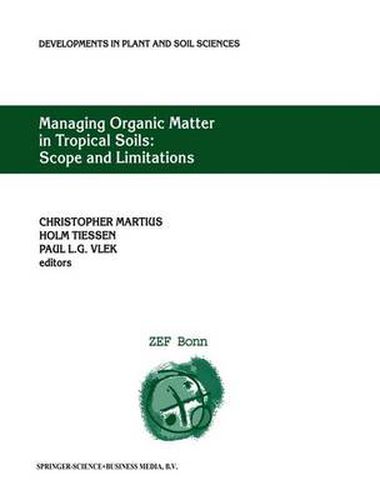Readings Newsletter
Become a Readings Member to make your shopping experience even easier.
Sign in or sign up for free!
You’re not far away from qualifying for FREE standard shipping within Australia
You’ve qualified for FREE standard shipping within Australia
The cart is loading…






This title is printed to order. This book may have been self-published. If so, we cannot guarantee the quality of the content. In the main most books will have gone through the editing process however some may not. We therefore suggest that you be aware of this before ordering this book. If in doubt check either the author or publisher’s details as we are unable to accept any returns unless they are faulty. Please contact us if you have any questions.
Soil organic matter is a reservoir for plant nutrients, provides water-holding capacity, stabilizes soil structure against compaction and erosion, and thus determines soil productivity. All agriculture to some degree depends on soil organic matter. It has long been known that soil organic matter declines when land is taken into cultivation, and that the productivity of new agricultural land is governed by fertility contributions from decomposing natural organic matter. The expansion of agriculture to ever new and more fragile lands, particularly in tropical and developing regions, causes environmental degradation with local effects on soil quality, regional effects on landscape integrity and water quality, and global effects on carbon cycles and the atmosphere.
This book summarizes current knowledge of the properties and dynamics of soil organic matter in the tropics, its role in determining soil quality, its stability and turnover, and the options for management in the context of tropical landuse systems, for a readership of resource scientists, economists and advanced students. Maintenance of organic matter is critical for preventing land degradation. Case studies and practical applications are therefore an important part of the book, as are the exploration of future directions in research and management.
$9.00 standard shipping within Australia
FREE standard shipping within Australia for orders over $100.00
Express & International shipping calculated at checkout
This title is printed to order. This book may have been self-published. If so, we cannot guarantee the quality of the content. In the main most books will have gone through the editing process however some may not. We therefore suggest that you be aware of this before ordering this book. If in doubt check either the author or publisher’s details as we are unable to accept any returns unless they are faulty. Please contact us if you have any questions.
Soil organic matter is a reservoir for plant nutrients, provides water-holding capacity, stabilizes soil structure against compaction and erosion, and thus determines soil productivity. All agriculture to some degree depends on soil organic matter. It has long been known that soil organic matter declines when land is taken into cultivation, and that the productivity of new agricultural land is governed by fertility contributions from decomposing natural organic matter. The expansion of agriculture to ever new and more fragile lands, particularly in tropical and developing regions, causes environmental degradation with local effects on soil quality, regional effects on landscape integrity and water quality, and global effects on carbon cycles and the atmosphere.
This book summarizes current knowledge of the properties and dynamics of soil organic matter in the tropics, its role in determining soil quality, its stability and turnover, and the options for management in the context of tropical landuse systems, for a readership of resource scientists, economists and advanced students. Maintenance of organic matter is critical for preventing land degradation. Case studies and practical applications are therefore an important part of the book, as are the exploration of future directions in research and management.